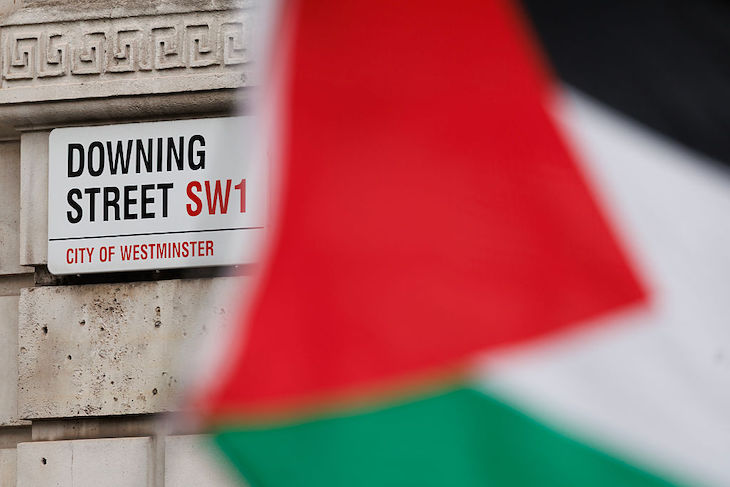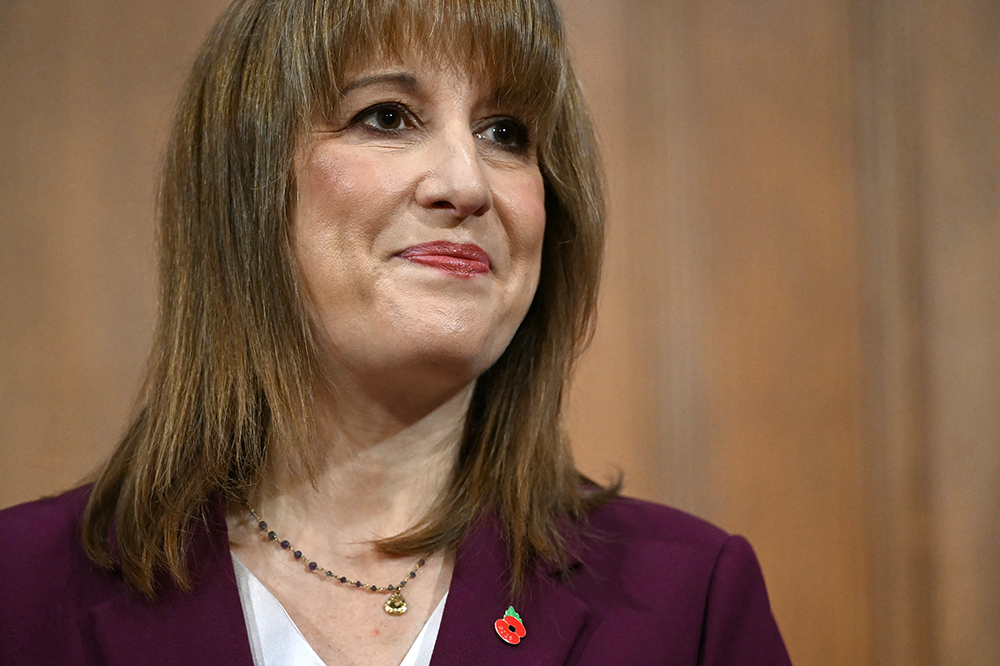At times, I still hear my late father, Sean O’Callaghan’s, voice echoing in my mind. Sean died in 2017 but there’s no doubt what he’d make of Britain today: that the sepsis of sectarianism is slowly, but surely, poisoning our bloodstream. We’re entrenching extremes and sidelining moderates.
Northern Ireland’s lesson is stark: entrench extremes, and moderation dies; let sectarianism fester, and democracy becomes zero-sum
The ugly scenes outside Villa Park this week as pro-Palestinian and Israeli protesters faced off are a shameful reminder of how British politics is changing for the worse. Britain’s new Islamo-socialist alliance is gaining ground: from Corbyn’s Your Party, to pro-Gaza independents. Voters are prioritising religion and imported grievances over potholes and schools. Tribal voting is taking over in England. In Scotland, and in Wales, the siren call of nationalism is drowning out those in the centre.
Sean knew what he was talking about. Radicalised as a boy by Republican irredentist sectarianism, he joined the IRA at 15, seduced by its tribal certainties. He planted bombs and killed people – an RUC Special Branch officer and a UDR Greenfinch soldier – acts that scarred his soul forever.
Yet his mother’s fierce moral code, insisting on personal accountability, and his own intellectual curiosity saved him. In prison, he devoured Conor Cruise O’Brien, Con Houlihan, John A. Murphy, Eric Hoffer, Edmund Burke, and Bishop Berkeley, unravelling ideology’s lies.
Sean’s story encapsulates Ireland’s and Ulster’s tragedy. Born in 1954 in County Kerry, he grew up in Tralee amid economic gloom and the North’s spilling violence. The IRA’s call to arms, framed as justice against British oppression, lured him young. By 17, he was an active volunteer, committing bloody deeds that became lifelong burdens.
His mother’s quiet morality planted seeds of doubt, and his innate curiosity – sparked by dog-eared library books – did the rest. O’Brien’s critiques exposed nationalism’s myopia; Houlihan offered humane wit; Murphy provided historical clarity; Hoffer dissected fanaticism; Burke revered organic society; Berkeley supplied philosophical rigour. Together, they revealed how sectarianism twists human nature into dogma.
By 1979, Sean had turned informer, risking everything to undermine the IRA, driven by hatred for the tribalism that had ensnared him. His voice, forged in extremism’s fires, loathed ideology’s simplicity and warned of its spread beyond Belfast. ‘It’s not the bombs that kill the soul,’ he said in our family kitchen one evening, ‘it’s the certainty that justifies them.’
What connected his world to ours, he’d insist, was the shared mechanics of division: turning votes into tribal tallies that reward outrage over outreach; elevating sincere ideologues who romanticise violence (or its ballot-box shadows) as noble resistance; and starving moderates of oxygen until the body politic convulses.
Northern Ireland’s Troubles thrived on a system that rewarded violence over reason. Moderates like the SDLP’s John Hume – who was personally very brave and took real risks with his safety to stand against sectarianism – and Seamus Mallon, and the UUP’s David Trimble – men of honour and peace – were marginalised. Yet Tony Blair’s brutal quip – ‘the shame about you guys is you have no guns’ – to Mallon, who was leading nationalism in the negotiations at that time, was revealing; it showed the disconnect from reality and real life.
Elections in Northern Ireland during the Troubles became sectarian headcounts, entrenching division; Catholic vs. Protestant tallies that turned democracy into a census of hate. Fast-forward to Britain in 2025, and the echo is deafening, the connections as direct as Belfast’s barricades transplanted to our council estates.
In High Wycombe this April, Gaza solidarity groups released a video instructing Muslim voters on whom to back in local elections. Tory leader Kemi Badenoch condemned it as ‘evil Islamist sectarianism,’ a phrase that could have been lifted from the pages of a 1970s Belfast dispatch.
Just as Republican apologists prioritised the North’s ‘oppression’ over local needs, voters were being effectively urged to sideline worldly issues. Ballots were cast not on civic merit, but tribal fealty – mirroring Ulster’s bloc voting, where identity, not ideas, dictated the tally. Moderates? Sidelined, their pleas for integrated debate dismissed as ‘Islamophobic’ or ‘Zionist.’ The result? A poison seeping into council chambers, turning local politics into imported feuds, much as Republican infiltrators once turned community halls into recruiting grounds.
It’s the same rot in the Green Party, once a haven for eco-dreamers, but now a vector for sectarian drift. It has been infiltrated just as Sinn Féin once wormed into Ulster’s voluntary groups via shared anti-imperialist networks. Their 2024 gains rode a wave of Muslim support fuelled by Gaza outrage, but by 2025, the fissures cracked wide. Councillor Mothin Ali, elected co-deputy leader in September, celebrated with cries of ‘Allahu Akbar!’ It was a victory lap that former deputy Shahrar Ali branded a ‘toxic cocktail of Islamism,’ accusing the party of procedural abuse to entrench hardliners.
Leader Zack Polanski’s eco-populism has veered into anti-Israel fervour and gender skirmishes, exploiting the party’s openness. Environmentalism becomes a Trojan horse for identity politics, just as nationalism masked Republican thuggery in Ulster. The parallel? Extremes reward the ‘guns’ – here, the shrill outrage of protests and boycotts – while genuine moderates, like Shahrar Ali, are purged or silenced. As a result, the Greens are haemorrhaging core voters to this sectarian surge. It echoes how the SDLP withered as Sinn Féin’s gun-shadow loomed.
Worse still is Jeremy Corbyn’s ‘Your Party,’ launched in July with his ex-Labour colleague Zarah Sultana amid public rows and membership chaos. Courting ethnic and sectarian blocs disillusioned with Labour – promising to ‘take on the rich’ while fanning Gaza flames – it polls at one in five Britons, one in three young people backing its anti-establishment rage.
Corbyn’s sincerity – his unyielding belief in this cocktail of socialism and imported grievances – mirrors the IRA’s true believers. Where Northern Ireland rewarded ex-terrorists with seats, Your Party elevates the excommunicated, trading policy nuance for tribal rallying cries that nourish far-right backlash, just as Ulster’s paramilitaries fed each other’s flames.
It’s the same rot in the Green Party, once a haven for eco-dreamers, but now a vector for sectarian drift
This sectarian fever spreads to our Celtic fringes too, where nationalism dons the cloak of progressive virtue but harbours a deep-seated grudge against the English core. It’s the same us-versus-them calculus that fuelled Ulster’s divides, imported via devolution’s half-measures.
Last month, Plaid Cymru snatched a historic by-election win in Caerphilly – their first in the Welsh Parliament there since its creation – trouncing Labour (in third place for the first time in a century) and Reform UK alike.
Lindsay Whittle’s victory, by a staggering margin, was hailed as ‘putting Caerphilly on the map,’ but beneath the cheers lurks the old poison: Welsh independence framed as social justice, yet rooted in a narrow anti-English tribalism that echoes Ulster’s Protestant-Catholic schism. Plaid’s rhetoric – soft Marxism on housing and devolution – masks a bloc mentality that prioritises ‘Cymru first’ over shared British interests, sidelining moderates who seek pragmatic cooperation, just as David Trimble was vilified for his bridge-building.
And up in Scotland? The SNP’s separatism is the masterclass in this deceit, swaddled in the language of the left – a ‘minimum income guarantee’, green pledges, a faux-internationalism that apes soft Marxism –yet driven at its core by a bitter, narrow anti-Englishness. Their 2024 Holyrood gains, built on Gaza solidarity and anti-West posturing, have entrenched a zero-sum worldview: Scotland vs. Westminster, as if the Union were an occupation rather than a partnership. Nicola Sturgeon’s heirs rally the faithful with cries of ‘independence now,’ dismissing Unionist moderates as ‘Westminster puppets,’ much like the DUP once branded Trimble a traitor for his Nobel-winning compromise.
This sepsis manifests in the streets, too
Polls show SNP support dipping below 30 per cent, yet their grip on power persists through tribal fealty, feeding English resentment in turn and risking a fractured UK. It’s the Troubles’ gift to the mainland: radicals cloaked as enlightenment, poisoning the body politic one devolved grudge at a time.
This sepsis manifests in the streets, too. Rochdale’s 2024 by-election, seized by George Galloway’s Workers Party on unapologetic pro-Palestine rhetoric, sidelined local woes for Middle Eastern score-settling. Galloway crowed ‘This is for Gaza’, as he claimed victory by over 12,000 votes. It was Belfast 1970s redux: foreign flags over union jacks, identity eclipsing the everyday.
And Leeds? The 2024 Harehills riots – sparked by a child welfare removal in a Romani community – ballooned into communal bonfires, and a double-decker bus torched amid cries of injustice. Fault lines between migrants and natives, that festered into 2025’s uneasy truce, were exposed. Police retreated as locals – Muslim men shielding kids, white Brits venting despair – clashed in a microcosm of Ulster’s no-go zones. Here, too, extremes fed the fire: far-right agitators online, community leaders decrying ‘racist’ authorities, moderates drowned out.
Today, Britain’s moderates – Blue Labour types or Tories – are the new SDLP, voiceless without outrage’s ‘guns.’ Burke’s wisdom offers the antidote: prudence over passion, organic unity over fractures. Sectarianism thrives when we reward the shrill, as in Ulster, where gunmen outranked statesmen.
Northern Ireland’s lesson is stark: entrench extremes, and moderation dies; let sectarianism fester, and democracy becomes zero-sum. It’s time instead to ignore those who shout the loudest and toast the moderates; they’re the only ones who can staunch the wound. Fail, and Britain’s body politic will succumb to Ulster’s fate: a slow sepsis we cannot outrun.







Comments